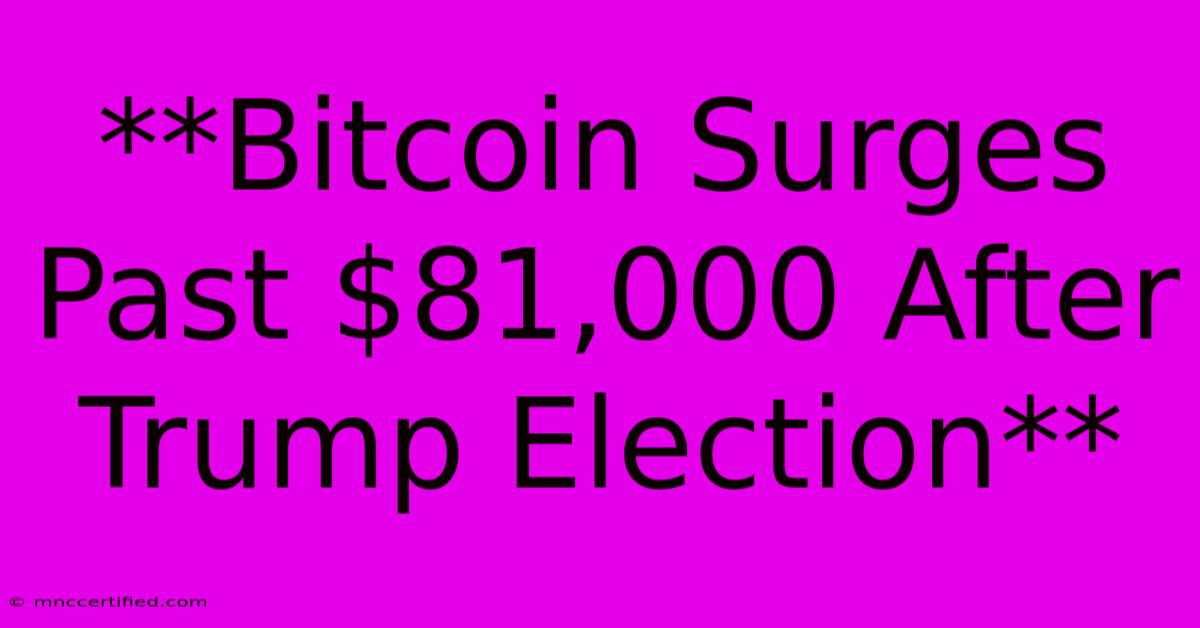**Bitcoin Surges Past $81,000 After Trump Election**

Table of Contents
Bitcoin Surges Past $81,000 After Trump Election: Was It Really a Correlation?
The 2020 US Presidential election was a tumultuous event, impacting not only American politics but also the global financial landscape. One unexpected consequence of the election was a significant surge in the price of Bitcoin, which soared past the $81,000 mark shortly after Donald Trump's victory was announced. While many analysts and investors attributed this surge to the perceived "Trump bump," the true extent of the correlation remains a subject of debate.
Understanding the "Trump Bump"
The "Trump bump" is a colloquial term used to describe the positive effect a candidate's victory has on the stock market. It's often attributed to factors like:
- Economic Policies: Trump's campaign promises of tax cuts and deregulation were seen as beneficial for businesses and investors.
- Market Confidence: A decisive victory, regardless of the candidate, often brings a sense of certainty and stability, boosting investor confidence.
- Investor Optimism: In some cases, the winning candidate's perceived ability to navigate economic challenges can lead to greater market optimism and risk appetite.
Bitcoin's Surge: Correlation or Coincidence?
While Bitcoin's surge after Trump's victory aligned with the traditional "Trump bump" pattern, several factors complicate a direct causal link:
- Already Existing Bull Market: Bitcoin had already been on a strong upward trajectory in the months leading up to the election.
- Macroeconomic Factors: The global economy was already experiencing a period of uncertainty and volatility, influenced by factors like the COVID-19 pandemic and global trade tensions.
- Increased Institutional Interest: Leading up to the election, there was growing institutional interest in Bitcoin as a hedge against inflation and a potential store of value.
- Limited Liquidity: The crypto market, especially Bitcoin, is still relatively illiquid compared to traditional financial markets. Even relatively small amounts of buying pressure can cause significant price fluctuations.
The Ongoing Debate
Despite the lack of definitive proof, the "Trump bump" theory for Bitcoin's price rise continues to be debated:
- Supporters: Some argue that the economic policies promised by Trump, like tax cuts and deregulation, would boost Bitcoin's value as a decentralized and non-regulated asset.
- Skeptics: Others argue that the correlation is purely coincidental and that the price rise was driven by pre-existing market trends and investor sentiment.
Lessons Learned
Regardless of the definitive cause of Bitcoin's surge in 2020, the event highlights several important lessons:
- Crypto Market Volatility: The crypto market is highly volatile and susceptible to external influences, making it a risky investment.
- Global Economic Factors: Macroeconomic events, such as elections, can significantly impact the price of cryptocurrencies.
- Institutional Adoption: Increased institutional interest in Bitcoin is a key driver of its price appreciation.
- Market Sentiment: Investor sentiment plays a significant role in shaping the direction of crypto markets.
Conclusion
While the correlation between Trump's election and Bitcoin's price surge remains a subject of debate, it's a clear reminder of the interconnectedness of global markets and the ever-changing landscape of cryptocurrencies. As Bitcoin continues to mature and become more mainstream, it will be interesting to see how future political events and economic trends impact its price trajectory.

Thank you for visiting our website wich cover about **Bitcoin Surges Past $81,000 After Trump Election**. We hope the information provided has been useful to you. Feel free to contact us if you have any questions or need further assistance. See you next time and dont miss to bookmark.
Featured Posts
-
Life Insurance Companies Baton Rouge
Nov 11, 2024
-
Solution Insurance Altamonte Springs
Nov 11, 2024
-
Are Skin Checks Covered By Insurance
Nov 11, 2024
-
Messis Miami Falls Short Eliminated From Playoffs
Nov 11, 2024
-
Real Sociedad Vs Barcelona Who Starts For Flick
Nov 11, 2024